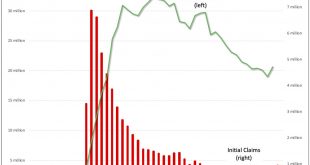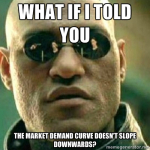from Asad Zaman This is a review and a summary of some of the key arguments presented by Mian and Sufi in their recent book “House of Debt.” It highlights the contribution of Mian and Sufi by showing how they have solved the mystery of why there was a huge drop in aggregate demand during the Great Depression of 1929 and also following the recent Global Financial Crisis of 2007-8. The article shows how major economists like Keynes, Friedman, Lucas and others tried and failed to provide an...
Read More »Economist Dean Baker exposes pharmaceuticals, Fox News caves, Pundit on autocrat Trump, more #PTFB
Powered by Restream https://restream.io/ Dr. Dean Baker sheds important light on the COVID-19 vaccine economics. Fox News backtrack voter machines, & autocrat Trump exposed.
Read More »ECONOMIC THOUGHT: History, Philosophy, and Methodology
Please click here to support this open access journal and the WEA Vol 9, No 2, 2020 Table of contents Consensus and Dissention among Economic Science Academics in Mexico Jorge L. Andere, Jorge Luis Canché-Escamilla, Álvaro Cano-Escalante 1 – 23 Economics’ Wisdom Deficit and How to Reduce It John F. Tomer 24 – 37 The Self According to Others: Explaining Social Preferences with Social Approbation Oswin Krüger Ruiz 38 – 54 What can Economists Learn from Deleuze? Abderrazak...
Read More »MMT perspectives on rising interest rates
from Lars Syll The Bank of England is today wholly-owned by the UK government, and no other body is allowed to create UK pounds. It can create digital pounds in the payments system that it runs, thus marking up and down the accounts of banks, the government and other public institutions. It also acts as the bank of the government, facilitating its payments. The Bank of England also determines the bank rate, which is the interest rate it pays to commercial banks that hold money (reserves)...
Read More »USA Pandemic Depression update
from David Ruccio Both the number of initial unemployment claims for unemployment compensation and the number of continued claims for unemployment compensation are once again on the rise, signaling a worsening of the Pandemic Depression. This morning, the U.S. Department of Labor (pdf) reported that, during the week ending last Saturday, another 935 thousand American workers filed initial claims for unemployment compensation. While initial unemployment claims remain well below the...
Read More »WEA Commentaries – vol.10, issue 4
Volume 10, Issue No. 4This WEA commentaries issue is a PDF document, selected articles are listed below… An interview with Professor Harold James on transformative crises and the end of globalization as we know it › How to Breathe 1—Capitalism as Robbery › One paradigm or many? Toward a democracy-oriented economics › Which healthcare system was up against coronavirus in Brazil? › Why do we need pluralism in times of disruption? A practical guide › The political economy of inequality...
Read More »Arrow-Debreu obsession
from Lars Syll I’ve never yet been able to understand why the economics profession was/is so impressed by the Arrow-Debreu results. They establish that in an extremely abstract model of an economy, there exists a unique equilibrium with certain properties. The assumptions required to obtain the result make this economy utterly unlike anything in the real world. In effect, it tells us nothing at all. So why pay any attention to it? The attention, I suspect, must come from some prior...
Read More »All the good things a digital euro could do – and all the bad things it will
from Norbert Häring and current issue of RWER On 2 October, the European Central Bank (ECB) announced in a press release that it intends to intensify its work on a digital euro. The ECB enumerated three scenarios under which it might want to issue a digital euro: (i) a sharp decline in the use of cash, (ii) “he launch of global private means of payment that might raise regulatory concerns and pose risks for financial stability and consumer protection” (read: Libra), and (iii) a broad...
Read More »Big Pharma strikes back
from Dean Baker and Arjun Jayadev On Monday, we, along with Achal Prabhala, had a column in the New York Times arguing in support of a resolution put forward before the WTO by India and South Africa, which would suspend intellectual property rights related to vaccines and treatments during the pandemic. The main point is that these rights are slowing the diffusion of life-saving medicines in a crisis. Furthermore, since much or all the cost of developing these vaccines and treatments were...
Read More »Firing a warning shot across big tech’s bows
from Jayati Ghosh It was a long time coming, but the day of reckoning for the big digital companies may finally have arrived. Despite the growing monopoly power of big tech and their use of anti-competitive practices, earlier attempts to regulate them (such as an attempt by the U.S. Department of Justice in 1998 to rein in Microsoft) had only limited success. The novel coronavirus pandemic further enhanced the monopoly power of the big tech giants. Timeline and actions But now, a rash of...
Read More » Real-World Economics Review
Real-World Economics Review



